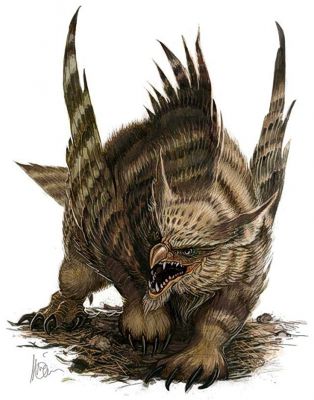

Monstrous Compendium Annual, Volume Three

| Climate/Terrain: | Any nonarctic |
|---|---|
| Frequency: | Very rare |
| Organization: | Family |
| Activity Cycle: | Dusk |
| Diet: | Carnivore |
| Intelligence: | Low (5-7) |
| Treasure: | Incidental |
| Alignment: | Neutral |
| No. Appearing: | 1 (2-5) |
| Armor Class: | 5 |
| Movement: | 12, Fl 18 (E) |
| Hit Dice: | 5+2 |
| THAC0: | 15 |
| No. of Attacks: | 3 |
| Damage/Attack: | 1d10/1d10/2d6 |
| Special Attacks: | Hug, surprise |
| Special Defenses: | Nil |
| Magic Resistance: | Nil |
| Size: | L (8’ tall) |
| Morale: | Steady (11-12) |
| XP Value: | 975 |
The winged owlbear is a true synthesis of owl and bear; unlike other species of owlbears, this one has a large pair of feathered wings growing from its shoulders.
However, the winged owlbear is just as nasty-tempered as its ground-dwelling cousin and communicates with the same screeching tones.
Combat: The flight of the winged owlbear is nearly silent due to the construction of its feathers – any prey has a penalty to its surprise roll of at least -2; in poor lighting, this might be as high as -6. A winged owlbear fights as do other owlbears, using its front claws and sharp beak. A claw hit on a roll of 18 or better establishes a hug, which allows one chance to escape using the bend bar/lift gate chances and otherwise allows the creature to inflict 2d8 points of damage per round.
Habitat/Society: The winged owlbear can be found in almost any non-arctic environment (though they are very scarce), but seems to prefer wooded forests or mountainous terrain. Their flying capabilities allow them to claim large areas as their territory – usually ten to twenty square miles.
Winged owlbears live as mated pairs. If encountered in their lairs, there is a 25% chance that 1d3 eggs (20% chance) or the same number of young (80% chance) will be present with the adults. The young are the same as normal owlbear young, as their wings will not supprt them until they reach full size.
Ecology: A winged owlbear tends to live slightly longer than other varieties, an age of 25 years or so is common. These creatures are sought by wizards for various reasons, though there is no record of any one being successfully domesticated.
